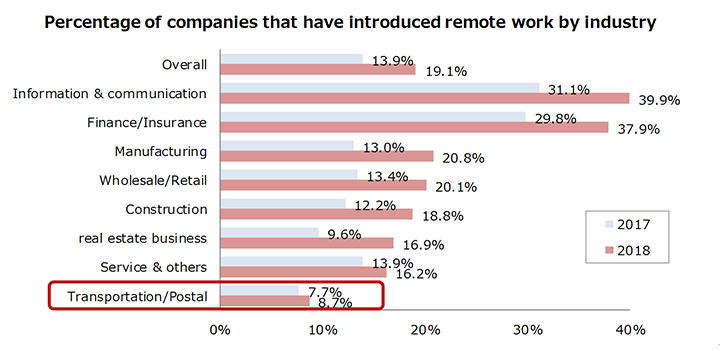Remote work in the Japanese logistics industry under COVID-19
June 16, 2020

Remote work under the state of emergency
In order to stop the spread of the novel coronavirus (COVID-19), the Japanese Prime Minister issued the emergency declaration in April 2020. Under the emergency declaration, governors became able to request citizens to refrain from going out or suspend business by legal support to reduce contact with people by 80%, thereby stopping the spread of infection.
Measures to reduce the amount of contact with people by 80% include changing the behavioural patterns regarding working styles. In response to the government's emergency declaration, many companies implemented "working from home", which is a form of remote work, to reduce the amount of movement associated with commuting. According to the e-survey conducted by the Ministry of Health, Labour and Welfare in Japan1, 26.8% of the respondents, whose main tasks are desk work (office work, planning, development, etc.), worked from home as of 12th -13th April.
As the number of newly infected persons decreases, the emergency declaration was firstly lifted in four prefectures on 14th May and all prefectures by 25th May. In fear of a second wave of COVID-19, however, many companies still continue to implement "work from home".
1.Ministry of Health, Labour and Welfare in Japan, Press Release on 30th April 2020
https://www.mhlw.go.jp/stf/newpage_11109.html
Remote work in the Japanese logistics companies
According to the questionnaire survey of Japan Institute of Logistics Systems (JILS) to its members including shippers and logistics companies2, which was conducted on 11th - 13th March, 68.6% of respondent shippers and 32.3% of respondent logistics companies chose "remote work / work from home" as measures to prevent COVID-19 infection of employees.
As of 2018, the pre-crisis period, the percentage of companies that introduced remote work was 19.1% of respondent companies3, and the transportation industry, including logistics, was the lowest at 8.7%. Although the target companies of each survey are different, it seems that logistics companies have made progress to an extent in remote work. Also in the survey of JILS, 81.4% of respondent shippers and 51.6% of respondent logistics companies selected "staggered working hours" as preventive measures.
2.Japan Institute of Logistics Systems (JILS)
3.Ministry of Internal Affairs and Communications of Japan
https://www.soumu.go.jp/johotsusintokei/statistics/data/190531_1.pdf

Source: Ministry of Internal Affairs and Communications of Japan
(https://www.soumu.go.jp/johotsusintokei/statistics/data/190531_1.pdf)
According to interviews carried out by Nittsu Research Institute and Consulting, Inc. to some leading logistics companies in Japan, even in companies where the target of remote work before COVID-19 crisis was limited, many of them have implemented remote work mainly amongst back-office staffs as a measure to prevent infection with COVID-19. On the other hand, although companies want to recommend remote work to logistics site workers as well, it is impossible for them to stop field operations involving movement of cargos. Hence interviewees said that most of logistics site workers are working normally. In addition, under the government's declaration of an emergency, citizens are requested to stay home, and consumer needs for courier service have increased. Accordingly, the courier business has been busy and it is not possible to reduce the number of staffs by implementing rotation work etc., and they are in full operation. Instead, they are taking the maximum possible measures to prevent the infection during commuting, such as switching to private cars from using trains/buses and staggered working hours.
At logistics sites, in addition to regular disinfection measures, securing of an appropriate distance in the case of face-to-face roll calls to truck drivers, avoiding giving documented work instructions to staffs by hand and placing them at the designated place instead, and non-face-to-face deliveries are devised.

Necessity of remote work as BCP measures
As described above, even in companies where remote work was limited to part of employees or that had not introduced it in a large scale before the COVID-19 pandemic, implementation of remote work has been progressing due to the spread of COVID-19 infection.
The main purpose of promoting remote work before COVID-19 crisis was to reduce traffic congestion for the Tokyo Olympic and Paralympic Games, improve work productivity, improve work-life balance and work style diversity, or as welfare benefit for employees with childcare or nursing care. Amid the COVID-19 outbreak, however, the main focus has shifted to securing business continuity while preventing the spread of infection and ensuring safety of its employees and customers.
This time, there would be some companies forced into remote work before preparing IT equipment or network sufficiently, as a result, employees could not perform as usual. Emergency situations is not limited to just viruses, but natural disasters also suddenly occur, hence maintaining remote work environment as a BCP measure will lead to business continuity and the protection of employees' lives.
This report was written based on information as of 28th May, 2020.